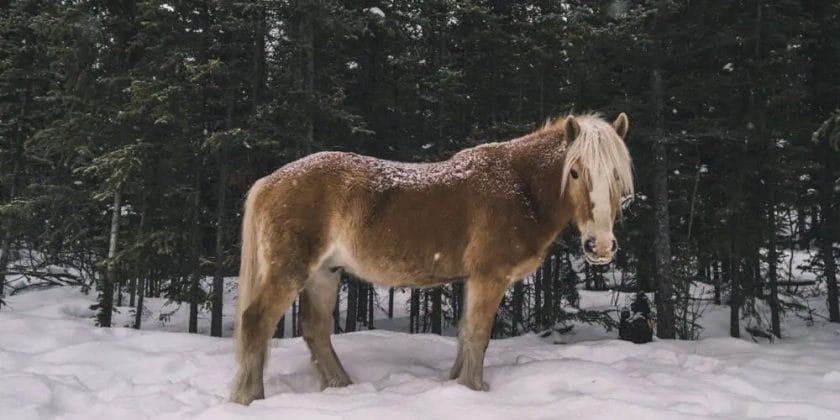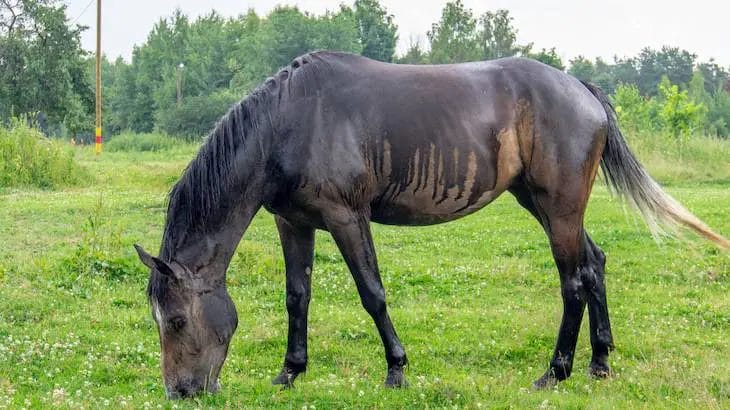Many people wonder whether horses get cold in the rain. Horses have natural protection against the rain, but prolonged exposure to wet and cold conditions can still affect their well-being. While their thick coats help to repel water, horses can still feel chilly if their fur becomes soaked and the temperature drops. It’s important for horse owners to provide shelter or waterproof blankets to keep their equine companions warm and comfortable during rainy weather.

Protecting Horses from Cold and Rain: Effective Strategies for Horse Owners
As horse owners, it is our responsibility to ensure that our equine companions are well taken care of, especially during harsh weather conditions such as cold and rain. These elements can pose a significant risk to the health and well-being of horses if proper precautions are not taken. In this section, we will discuss some effective strategies to protect horses from cold and rain, ensuring their comfort and safety.
1. Provide Adequate Shelter
The first step in protecting horses from cold and rain is to provide them with adequate shelter. A well-built and weatherproof stable or barn can offer protection from the elements. The shelter should have proper ventilation to prevent moisture buildup and should be large enough for the horse to move around comfortably. Additionally, make sure to regularly check the roof for any leaks and repair them promptly to prevent water from seeping in.
You can also provide your horses with run-in sheds or shelters in the pasture, allowing them to seek refuge whenever they feel the need. These shelters should be strategically placed in areas where they are shielded from strong winds and have good drainage to prevent flooding.
2. Use Blankets and Sheets
Blankets and sheets can be valuable tools in protecting horses from cold and rain. Depending on the temperature and weather conditions, use appropriate blankets to provide extra insulation. There are different types of blankets available, such as turnout blankets, stable blankets, and waterproof sheets.
Turnout blankets are designed for outdoor use and are typically waterproof, providing excellent protection against rain and snow. Stable blankets, on the other hand, are meant for use inside the stable and offer warmth without the waterproof feature. Waterproof sheets can be used in mild rain conditions when full coverage is not necessary.
3. Ensure Proper Nutrition
Proper nutrition plays a crucial role in keeping horses healthy and resilient against cold and rain. During colder months, horses require more calories to maintain their body temperature. Increase their forage intake by providing high-quality hay or supplying additional feed if necessary.
Ensure that your horses have access to clean, fresh water at all times, as dehydration can be a risk in cold weather. Consider using heated water buckets or tank heaters to prevent water from freezing, making it more appealing for horses to drink.
4. Maintain Regular Exercise
Regular exercise is essential for horses, even during cold and rainy weather. Exercise helps keep their muscles warm and aids in digestion, which can be affected by cold temperatures. However, exercise should be moderate and appropriate for the weather conditions. Avoid strenuous activities during extreme cold or wet weather, as it may put unnecessary stress on the horse.
5. Monitor for Signs of Discomfort
It is important to monitor your horses for any signs of discomfort or distress related to cold and rain. Look out for shivering, huddling, or seeking shelter excessively, which may indicate that they are not adequately protected. Check for any signs of hypothermia, such as a drop in body temperature or lethargy. If you notice any concerning symptoms, consult with a veterinarian for further guidance.
6. Consider Additional Measures
Depending on the severity of the weather conditions, you may need to take additional measures to protect your horses. These may include using windbreaks or providing extra bedding in the stable to increase insulation. Applying a waterproof coat spray can also help enhance the horse’s resistance to rain and moisture.
Remember to regularly assess your horse’s living conditions and adjust your strategies accordingly. Every horse is unique, and their level of tolerance to cold and rain may vary. By being proactive and implementing effective strategies, you can ensure the well-being of your horses even during challenging weather conditions.

Understanding the Impact of Rain on Horses: How to Keep Them Comfortable
Rain can have a significant impact on horses, affecting their overall well-being and health. As responsible horse owners, it is essential to understand how rain can affect our equine friends and take appropriate measures to keep them comfortable. In this section, we will delve into the various ways rain can impact horses and discuss strategies to ensure their comfort during wet weather.
The Effect of Rain on Horses
When it comes to rain, horses can experience both physical and psychological effects. Let’s take a closer look at each of these:
1. Physical Impact
Horses are generally resilient creatures, but exposing them to prolonged and heavy rain can have adverse effects on their health. Here are some physical impacts rain can have on horses:
- Dampness: Rain can soak through a horse’s coat, causing it to become damp. This dampness can lead to discomfort and, in some cases, even hypothermia.
- Skin Issues: Moisture from rain can soften the skin, making it more susceptible to developing skin conditions such as rain rot or mud fever.
- Hoof Problems: Extended exposure to wet conditions can make a horse’s hooves soft and prone to issues like thrush or white line disease.
- Respiratory Concerns: Horses kept in poorly ventilated or damp environments during rainstorms can develop respiratory discomfort or even respiratory infections.
2. Psychological Impact
Aside from the physical effects, rain can also impact a horse’s mental and emotional well-being:
- Anxiety and Stress: Rain can be accompanied by thunder, lightning, and loud noises, which can be distressing for horses. This can lead to increased anxiety and stress levels.
- Disruption of Routine: Horses are creatures of habit, and rainy weather can disrupt their regular feeding, exercise, and turnout schedules. This disruption can cause stress and unrest.
- Reduced Social Interaction: Wet weather often keeps horses indoors, limiting their social interaction with other horses. This isolation can lead to feelings of loneliness and boredom.
Keeping Horses Comfortable in the Rain
To ensure the comfort of our equine companions during rainy weather, here are some strategies and practices to consider:
1. Shelter and Bedding
Providing adequate shelter is crucial to help horses stay dry during rainstorms. Ensure your barn, stable, or shelter is weatherproof and leak-free. Additionally, offer enough bedding to help absorb moisture and provide a comfortable resting area for the horses.
2. Protective Gear
Investing in appropriate protective gear for your horses can go a long way in keeping them comfortable during wet weather. Consider using waterproof blankets or sheets to protect their coats from becoming saturated. Additionally, equine raincoats or neck covers can help keep their necks and chests dry.
3. Proper Ventilation
When housing horses during rainy weather, ensure that the stable or barn has proper ventilation to prevent the buildup of moisture and ammonia. Adequate airflow will help minimize the risk of respiratory issues and maintain a healthy environment.
4. Regular Grooming
Routine grooming is essential, especially during wet weather. Regularly brush your horses to remove dirt and moisture from their coats, preventing skin issues such as rain rot. Pay special attention to their hooves, ensuring they are cleaned and dried to prevent any hoof-related problems.
5. Mental Stimulation
To combat the boredom that can arise from being confined indoors during rainy weather, provide mental stimulation for your horses. Offer toys, puzzles, or treat-dispensing devices to keep their minds engaged and alleviate feelings of loneliness or restlessness.
6. Adjusted Exercise Routine
While turnout may be limited during heavy rain, it is essential to adjust your horse’s exercise routine to ensure they still get the physical activity they need. Consider using indoor arenas or introducing groundwork exercises to keep them active and prevent excessive pent-up energy.
7. Regular Veterinary Care
Regular veterinary check-ups are vital for maintaining your horse’s health, even during rainy seasons. Keep up with vaccinations, deworming, and dental care

Rainy Weather Care: Preventing Chills and Ensuring Horse Health
When it comes to taking care of horses, one of the most important aspects is ensuring their health and well-being, especially during rainy weather. Rain not only brings about wet conditions but also increases the chances of horses getting chills and falling ill. As responsible horse owners, it is crucial to take necessary precautions to protect our equine companions from the adverse effects of rainy weather. In this section, we will explore some essential tips and practices to prevent chills and ensure the overall health of horses during rainy weather.
1. Provide Adequate Shelter
One of the first steps in protecting horses from the rain is to provide them with suitable shelter. A well-built barn or a three-sided shed can offer horses a dry and comfortable space to take refuge during wet weather. Make sure the shelter is free from leaks and provides ample space for all the horses in the herd.
2. Use Waterproof Blankets or Sheets
Another effective way to keep horses dry during rainy weather is by using waterproof blankets or sheets. These protective coverings can be worn by horses while they are outside in the pasture or during turnout sessions. Waterproof blankets act as a barrier, preventing the rain from soaking into the horse’s coat and causing chills.
3. Check and Maintain Good Drainage
Proper drainage plays a crucial role in preventing waterlogging and muddy conditions in horse turnout areas. Regularly check and maintain the drainage systems to ensure that water flows away from the grazing areas. This will help keep the horses’ environment dry and reduce the risk of them standing in wet and muddy conditions that can lead to health issues.
4. Drying off after Rain Exposure
After horses have been exposed to the rain, it is essential to dry them off thoroughly. Use absorbent towels or blankets to remove any excess moisture from their coat. Pay extra attention to the legs and underbelly areas, as these are more prone to moisture accumulation. Drying off the horses will help prevent them from catching a chill and developing respiratory problems.
5. Monitor Hoof Health
Rainy weather can soften the ground and make it more prone to mud, which can have a negative impact on hoof health. Regularly check and clean the hooves to remove any mud, debris, or stones that may get lodged. This will help prevent any discomfort or infections that could arise from compromised hoof health. It is also advisable to consult with a farrier for proper hoof care during the rainy season.
6. Adjust Feeding and Nutrition
Horses may have different nutritional requirements during rainy weather. Consult with a veterinarian or equine nutritionist to adjust the horses’ diet accordingly. Providing supplements such as vitamin E and omega-3 fatty acids can help support the immune system and promote overall health. Additionally, ensure horses have access to fresh water at all times, as their water intake may increase during rainy weather.
7. Maintain Regular Exercise
Even during rainy weather, it is important to maintain regular exercise routines for horses. Exercise helps improve blood circulation, strengthens the immune system, and keeps the horses mentally and physically stimulated. However, it is crucial to exercise caution and avoid slippery surfaces to prevent injuries.
8. Regular Veterinary Check-ups
Lastly, regular veterinary check-ups are essential for monitoring the overall health of horses, particularly during the rainy season. A veterinarian can assess and address any health issues promptly, provide necessary vaccinations, and offer guidance on specific care practices tailored to individual horses.
In summary, taking care of horses during rainy weather requires proactive measures to prevent chills and ensure their health. Providing adequate shelter, using waterproof blankets, maintaining good drainage, drying off after rain exposure, monitoring hoof health, adjusting feeding and nutrition, maintaining regular exercise, and scheduling regular veterinary check-ups are all vital steps in protecting our equine companions from the adverse effects of rainy weather. By implementing these practices, we can ensure that our horses stay healthy, comfortable, and happy, regardless of the weather conditions.
Essential Rainy Day Horse Care: How to Keep Your Equine Friend Warm and Dry
When it comes to caring for your horse, rainy days can present a unique set of challenges. Wet weather not only poses health risks for horses, but it can also make them uncomfortable and affect their overall well-being. To ensure that your equine friend stays warm and dry during rainy days, here are some essential tips that every horse owner should follow.
1. Provide Adequate Shelter
One of the most important things you can do to keep your horse warm and dry during rainy days is to provide them with a suitable shelter. This could be a well-built stable, a run-in shed, or even a large, sturdy tree that offers protection from the rain. Make sure that the shelter is large enough for your horse to comfortably move around and lay down in.
2. Use Proper Bedding
Another key aspect of rainy day horse care is the choice of bedding. Opt for a bedding material that is absorbent and helps to keep your horse dry. Straw and wood shavings are popular choices, as they provide insulation and can absorb moisture effectively. Regularly clean and replace the bedding to maintain a clean and dry environment for your horse.
3. Provide Waterproof Blankets
Investing in waterproof blankets for your horse is crucial during rainy days. These blankets are designed to repel water and keep your horse’s coat dry. Make sure to choose a blanket that fits properly and covers the horse’s entire body, including the neck and tail. Regularly check the blankets for any damage or wear and tear, and replace them if necessary.
4. Maintain Proper Hoof Care
Rainy weather can lead to muddy paddocks and pastures, which can have a negative impact on your horse’s hooves. Regularly clean and inspect your horse’s hooves to prevent any issues such as thrush or other infections. Consider using hoof boots or applying a hoof sealant to protect the hooves from excessive moisture.
5. Implement a Feeding and Watering Plan
During rainy days, horses may spend more time indoors or sheltered, which can affect their feeding and watering routine. Ensure that your horse has access to fresh, clean water at all times, preferably in a covered or sheltered area. Adjust your horse’s feeding schedule as needed and provide them with hay or other suitable forage to keep them occupied and satisfied.
6. Monitor for Signs of Illness
Wet weather can increase the risk of certain health issues for horses. Keep a close eye on your horse for any signs of illness or discomfort, such as a persistent cough, nasal discharge, or lethargy. If you notice any concerning symptoms, consult with your veterinarian for proper diagnosis and treatment.
7. Exercise and Mental Stimulation
Even on rainy days, it’s important to provide your horse with exercise and mental stimulation. If the weather permits, consider hand-walking or lunging your horse in an indoor arena or covered area. Engage them in interactive activities or provide them with equine toys to keep their minds occupied and prevent boredom.
In summary, taking care of your horse during rainy days requires proper planning and attention to detail. By providing adequate shelter, using suitable bedding, investing in waterproof blankets, maintaining hoof care, implementing a feeding and watering plan, monitoring for signs of illness, and providing exercise and mental stimulation, you can ensure that your equine friend stays warm, dry, and healthy even when the rain is pouring outside.
FAQs
Do horses get cold in the rain?
Yes, horses can get cold in the rain, especially if they don’t have appropriate shelter or protective gear. Their thick coat may provide some insulation, but prolonged exposure to rain can make them cold and uncomfortable. It’s important to provide them with shelter or waterproof blankets to keep them warm and dry.
Conclusion:
In conclusion, horses can indeed get cold in the rain. While they are naturally equipped to handle various weather conditions, continuous exposure to cold rain can result in discomfort and health issues for horses. It is essential for horse owners to provide adequate shelter, such as a stable or a waterproof turnout sheet, to protect their horses from getting soaked and chilled. Additionally, providing proper nutrition and ensuring that horses have access to freshwater can help them regulate their body temperature and stay warm during rainy weather. Taking these precautions will help keep horses healthy and comfortable even in wet and chilly conditions.
